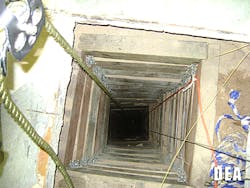Sophisticated Drug Tunnels Discovered on Mexican Border
PHOENIX (AP) — Two drug-smuggling tunnels outfitted with lighting and ventilation systems were discovered along the U.S.-Mexico border, the latest signs that cartels are building sophisticated passages to escape heightened surveillance on land.
Both tunnels were at least 150 yards long. One began under a bathroom sink inside a warehouse in Tijuana but was unfinished and didn't cross the border into San Diego. The Mexican army found the tunnel Wednesday.
The other was completed and discovered Saturday in a vacant strip mall storefront in the southwestern Arizona city of San Luis. It showed a level of sophistication not typically associated with other crude smuggling passageways that tie into storm drains in the state.
"When you see what is there and the way they designed it, it wasn't something that your average miner could put together," said Douglas Coleman, special agent in charge of the Phoenix division of the Drug Enforcement Administration. "You would need someone with some engineering expertise to put something together like this."
As U.S. authorities heighten enforcement on land, tunnels have become an increasingly common way to smuggle enormous loads of heroin, marijuana and other drugs into the country. More than 70 passages have been found on the border since October 2008, surpassing the number of discoveries in the previous six years.
A total of 156 secret tunnels have been found along the border since 1990, the vast majority of them incomplete.
Raids last November on two tunnels linking San Diego and Tijuana netted a combined 52 tons of marijuana on both sides of the border. In early December 2009, authorities found an incomplete tunnel that stretched nearly 900 feet into San Diego from Tijuana, equipped with an elevator at the Mexican entrance.
The latest Arizona tunnel was discovered after state police pulled over a man who had 39 pounds of methamphetamine in his vehicle and mentioned the strip mall.
The tunnel was found beneath a water tank in a storage room and stretched across the border to an ice-plant business in the Mexican city of San Luis Rio Colorado. It was reinforced with four-by-six beams and lined with plywood.
Investigators believe the tunnel wasn't in operation for long because there was little wear on its floor, and 55-gallon drums containing extracted dirt hadn't been removed from the property.
Coleman said investigators can't yet say for sure if the tunnel, estimated to cost $1.5 million to build, was operated by the powerful Sinaloa cartel. Still, authorities suspect cartel involvement because the group from Sinaloa controls smuggling routes into Arizona.
"Another cartel wasn't going to roll into that area and put down that kind of money in Sinaloa territory," Coleman said. "Nobody is going to construct this tunnel without significant cartel leadership knowing what's going on."
U.S. authorities were investigating the Tijuana tunnel for three months, said Lauren Mack, a spokeswoman for U.S. Immigration and Customs Enforcement. Authorities found no connections to the smuggling operation involving the Arizona passageway.
The Tijuana tunnel was discovered inside a building advertised as a recycling plant in an area where industrial warehouses are common on both sides of the border.
The Mexican army said two tractor-trailers were found inside the warehouse, along with shovels, drills, pickaxes, buckets and other excavation tools.
The Mexican army estimated the tunnel was about 150 yards long and more than 10 yards underground. The walls were lined with dirt and wide enough for one person to get through comfortably.
It takes six months to a year to build a tunnel, authorities say. Workers use shovels and pickaxes to slowly dig through the soil, sleeping in buildings where the tunnels begin until the job is done. Sometimes they use pneumatic tools.
___
Spagat reported from San Diego.

